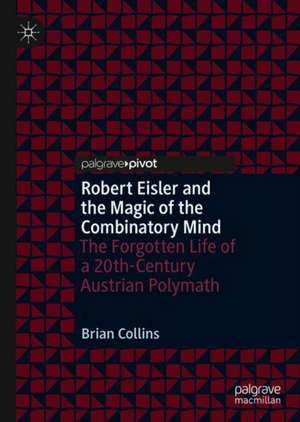Robert Eisler and the Magic of the Combinatory Mind: The Forgotten Life of a 20th-Century Austrian Polymath
Autor Brian Collinsen Limba Engleză Hardback – 5 ian 2021
Robert Eisler, the polymathic Jewish Austrian scholar and Holocaust survivor, faded into obscurity after his death in 1949. A contemporary and associate of Walter Benjamin, Aby Warburg, and Gershom Scholem, Eisler spent his early years in fin-de-siècle Vienna and trained as an art historian and economist. In this book, the first in English devoted to Eisler’s life and thought, Brian Collins takes us through the development of Eisler’s ideas about the philosophy of values, comparative mythology, Christianity, psychoanalysis, monetary policy, and anthropology. Collins also explores the bizarre and sometimes tragic events that defined Eisler’s life, including his arrest for art theft in 1907, his controversial reconstruction of a physical description of Jesus, and the fifteen months he spent in Dachau and Buchenwald, the inspiration for his final book, Man into Wolf: An Anthropological Interpretation of Sadism, Masochism, and Lycanthropy.
Preț: 489.30 lei
Nou
Puncte Express: 734
Preț estimativ în valută:
93.66€ • 101.77$ • 78.72£
93.66€ • 101.77$ • 78.72£
Carte tipărită la comandă
Livrare economică 21 aprilie-05 mai
Preluare comenzi: 021 569.72.76
Specificații
ISBN-13: 9783030612283
ISBN-10: 3030612287
Pagini: 157
Ilustrații: XVII, 157 p. 4 illus.
Dimensiuni: 148 x 210 mm
Greutate: 0.45 kg
Ediția:1st ed. 2021
Editura: Springer International Publishing
Colecția Palgrave Macmillan
Locul publicării:Cham, Switzerland
ISBN-10: 3030612287
Pagini: 157
Ilustrații: XVII, 157 p. 4 illus.
Dimensiuni: 148 x 210 mm
Greutate: 0.45 kg
Ediția:1st ed. 2021
Editura: Springer International Publishing
Colecția Palgrave Macmillan
Locul publicării:Cham, Switzerland
Cuprins
1. Introduction: Man into Wolf.- 2. Vienna and Value Theory.- 3. The Turn to Art History: Aloïs Riegl, Giovanni Morelli, and the Udine Incident.- 4. “Ladies’ Coats and Beach Cabanas in Light of the History of Religion:” Cosmology, Gershom Scholem, and Walter Benjamin.-5. Orphism, the Afikoman, and Conflicts with Hamburg Circle.- 6. The King Who Did Not Reign: The League of Nations and the Slavonic Josephus.- 7. Negative Interest: The Dual Currency Model and the Journey to America.- 8. Dreamwork: The Fourth Gospel, Eranos, and the Turn to Psychoanalysis.- 9. Dachau and Buchenwald.- 10. Vanity of Vanities: Astrology, Ecclesiastes, and Last Days in England.- 11. Conclusion: Man into Wolf Revisited; or, The Method and the Magic of the Combinatory Mind.
Recenzii
“Collins’s book is the first full-length study of the brilliant if eccentric Austrian-Jewish polymath, Robert Eisler. … Collins has done us the service of brilliantly synthesizing an unbelievably rich textual corpus and allowing us to enjoy, even if (because?) we never fully penetrate its secrets, the ‘magic of the combinatory mind.’” (Bruce Rosenstock, Religious Studies Review, Vol. 47 (4), December, 2021)
Notă biografică
Brian Collins is the Drs. Ram and Sushila Gawande Chair in Indian Religion and Philosophy at Ohio University, USA.
Textul de pe ultima copertă
Robert Eisler, the polymathic Jewish Austrian scholar and Holocaust survivor, faded into obscurity after his death in 1949. A contemporary and associate of Walter Benjamin, Aby Warburg, and Gershom Scholem, Eisler spent his early years in fin-de-siècle Vienna and trained as an art historian and economist. In this book, the first in English devoted to Eisler’s life and thought, Brian Collins takes us through the development of Eisler’s ideas about the philosophy of values, comparative mythology, Christianity, psychoanalysis, monetary policy, and anthropology. Collins also explores the bizarre and sometimes tragic events that defined Eisler’s life, including his arrest for art theft in 1907, his controversial reconstruction of a physical description of Jesus, and the fifteen months he spent in Dachau and Buchenwald, the inspiration for his final book, Man into Wolf: An Anthropological Interpretation of Sadism, Masochism, and Lycanthropy.
Caracteristici
Explores the life and work of Robert Eisler, one of the most interesting yet forgotten thinkers of the 20th century Combines historical narrative with an exploration of the wide array of intellectual currents of the mid-20th century Discusses Eisler's ideas about philosophy of values, comparative mythology, Christianity, psychoanalysis, monetary policy, and anthropology
